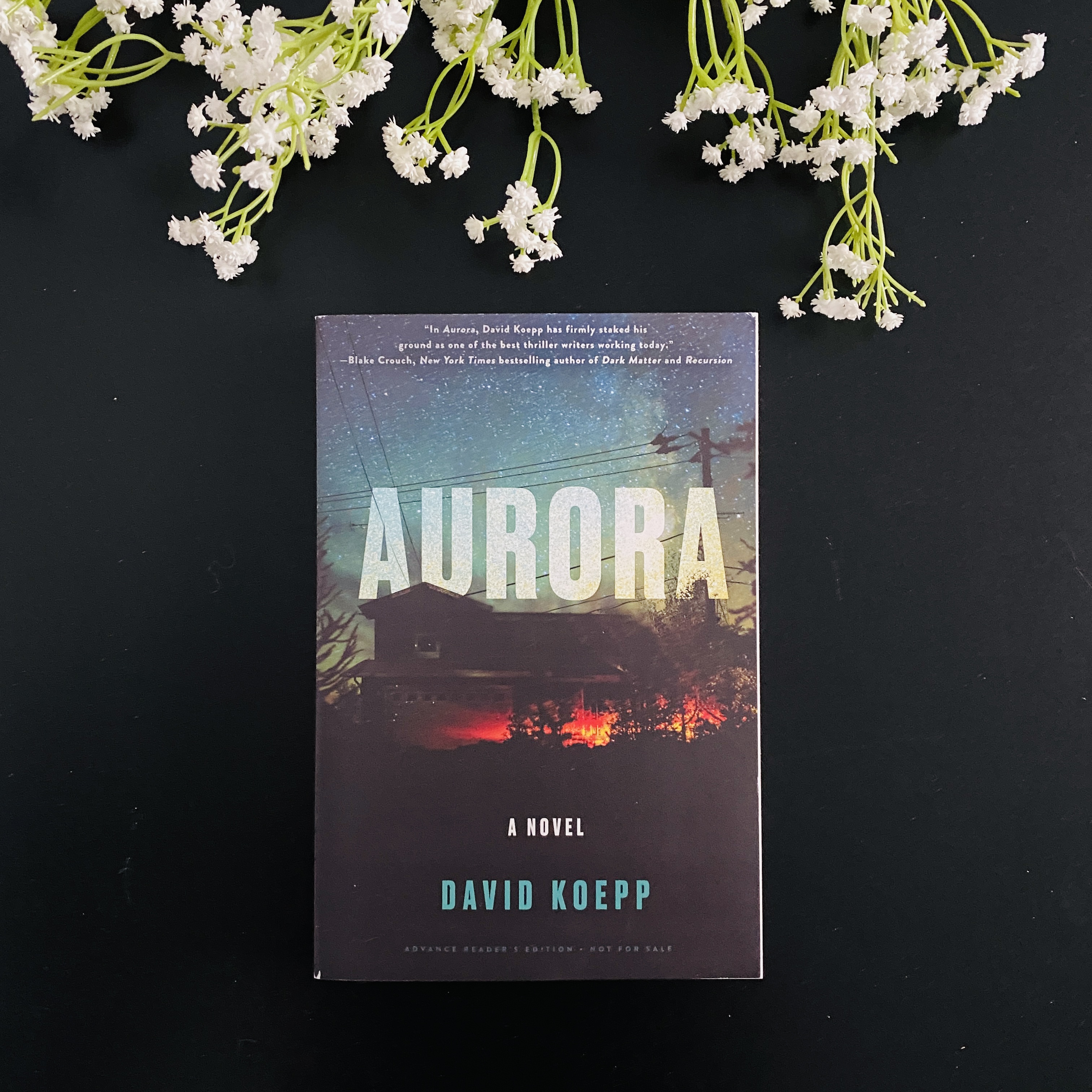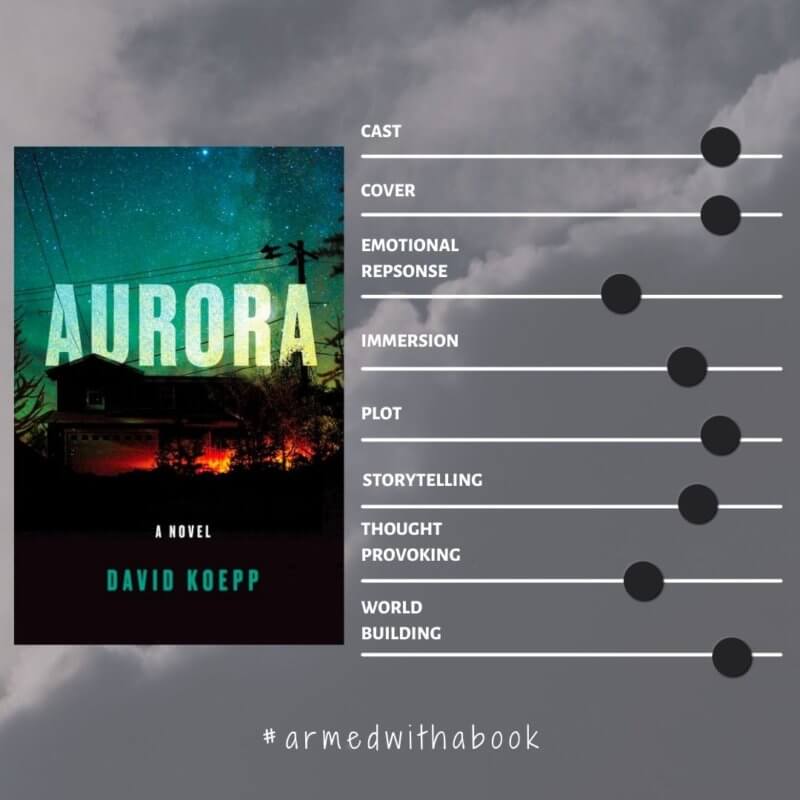Welcome friend! The first book I ever received from a publisher was Cold Storage by David Koepp. It was back in 2019 that I reviewed it on the blog and it brings me so much joy to review another book by David Koepp three years later. Aurora is set in a world where there is no electricity. Through its characters, it challenges the comforts of the world we take advantage of and what we would do when they no longer exist. Take a look at the synopsis below and then read on for my thoughts.

From the author of Cold Storage comes a riveting, eerily plausible thriller, told with the menace and flair of Under the Dome or Project Hail Mary, in which a worldwide cataclysm plays out in the lives of one complicated Midwestern family.
In Aurora, Illinois, Aubrey Wheeler is just trying to get by after her semi-criminal ex-husband split, leaving behind his unruly teenage son.
Then the lights go out–not just in Aurora but across the globe. A solar storm has knocked out power almost everywhere. Suddenly, all problems are local, very local, and Aubrey must assume the mantle of fierce protector of her suburban neighborhood.
Across the country lives Aubrey’s estranged brother, Thom. A fantastically wealthy, neurotically over-prepared Silicon Valley CEO, he plans to ride out the crisis in a gilded desert bunker he built for maximum comfort and security.
But the complicated history between the siblings is far from over, and what feels like the end of the world is just the beginning of several long-overdue reckonings–which not everyone will survive . . .
Aurora is suspenseful storytelling–both large scale and small–at its finest.
Content notes include violence, emotional, physical, domestic abuse, lawlessness, death, car accident.
Thoughts on Aurora
The pandemic taught people a number of things but while it may have gotten some people to be preemptively prepared for another disaster that would drastically change their lives, most of the world was still unprepared when a massive solar storm took out electricity around most of the globe. Aurora is the story of two siblings, each handling this situation in their unique way. Aurora, Illinois is where they grew up. After their parents’ death while Aubrey stayed and made it her home, Thom left to live in the Silicon Valley and make a name for himself. The relationship between the siblings is complex. There is a debt there that weighs on both of them in different ways and the book does a good job of revealing how something that happened when Aubrey was 15 years old and Thom was 18 has driven their different life choices.
When the lights go out, both realize that their world has become much smaller. There is no Internet, no power, they have to find a way to either adapt and go back to the way life used to without those amenities, or find a sanctuary that keeps their 21st century way of life alive.

I loved Aubrey! She is a strong independent woman who doesn’t quite understand her own worth and the time with the blackout brings out the amazing person that she is. Left to take care of her ex-husband’s teenage son, Scott, she is learning to be a parent on the job. Rusty, her ex-husband, is a gambler who continues to believe that he will finally hit the jackpot one day. He comes back to her over and over, even when she and Scott both have set clear boundaries that they do not want to see him, and the blackout only makes his sinister good-for-nothing personality shine brighter and become more dangerous.
Aurora is divided into three parts. The first part is the set up for the characters where the global solar event is picked up by scientists and pandemonium is just beginning. The ties to community that are generally quite superficial in western society (who really knows their neighbours?) is challenged and people have to come together to protect themselves as well as keep alive. I found the first part hard to get through. Everyone is flawed in their unique way and this sets the stage for how bad it gets later. I was often reminded of The Walking Dead show.
In the next part, four months after the blackout, the world is a different place. Thom, with his preparation, is holed up in a bunker in a desert while Aubrey is working with her neighbours to make sure they have enough food and water. While Thom is not the nicest person in the world, he loves his sister. His actions may be misaligned with the time they live in now but his intentions are nobel. I liked how different Thom and Aubrey are in approaching this blackout event. While one focuses on the community and land, the other wants to continue to live in his previous comforts – because why not? He is a billionaire. What can money not buy?
The last half of the book reads like a fast-paced thriller as the characters come together and Aurora becomes the epicentre of the events. Rusty’s bad choices come to haunt Aubrey and get Thom tangled in. There is bloodshed and violence but also solidarity and love.

Aurora is a thought-provoking yet hard read. It challenges the way we live today and reveals the layers of life and comforts that peel away as they are unsustainable when there is no electricity or continuous water supply or the general structures of society – police, healthcare, law, justice. Through Aubrey, it also sets an example of what it means to take life in stride and let happiness find oneself. Through the oldest characters, Norman, a scientist, Aurora pays homage to old classics of The Count of Monte Cristo (one of my favorite books – isn’t it the best to see a paraphrased quote and know exactly who said it and when?) and Man’s Search for Meaning (one I referred to in my Wintering review).
If you are interested to read Aurora, add it to your bookshelf on Goodreads.
Many thanks to the publisher for providing me a complimentary copy of the book in exchange for an honest review.

Be First to Comment